The 2024/25 UEFA Women’s Champions League semifinals will be decided over the next two days, as the second leg of the home-and-away quarterfinals cuts Europe’s surviving eight teams down to four.
Each of the first-leg victors boasts a multi-goal advantage over their opponents, with three-time UWCL winners — and defending champs — Barcelona leading the way after taking a 4-1 victory from German side Wolfsburg.
Eight-time champions Lyon also have a Bundesliga club on the ropes thanks to a 2-0 first-leg win over Bayern Munich.
Perennial winners aside, the knockout round’s most anticipated storylines belong to the three remaining English clubs: Arsenal, Manchester City, and Chelsea.
While Chelsea FC is enjoying an eight-point lead on the WSL table, they're position in UWCL play is far more perilous. Earlier this month, former former Arsenal striker Vivianne Miedema boosted City over the Blues with a brace in the pair's first quarterfinal meeting.
Thursday will see the second all-WSL clash of the Champions League quarters, as the match also marks an unusual fourth consecutive meeting between the two teams, with Chelsea winning the League Cup final earlier this month as well as the pair's Sunday WSL meeting — both by 2-1 scorelines.
Like the Blues, Arsenal’s Champions League campaign is similarly down to the wire, as the Gunners attempt to climb out of a 2-0 hole against Real Madrid on Wednesday. This time, however, Arsenal will hold a home-pitch advantage, hosting Las Blancas at the iconic Emirates Stadium — a significant boost after a first-leg match marred by particularly slippery playing conditions.
How to watch the 2024/25 UEFA Champions League quarterfinals
The second and final leg of the UWCL quarterfinals kicks off on Wednesday, with Lyon hosting Bayern Munich at 1:45 PM ET before Real Madrid visits Arsenal at 4 PM ET.
Thursday will determine the last two semifinalists, as Barcelona takes on Wolfsburg at 1:45 PM ET before the all-WSL face-off between Chelsea and Manchester City begins at 4 PM ET.
All Champions League matches will stream live on DAZN.
More than 125 women's soccer pros signed an open letter to FIFA earlier this week urging the international governing body to end its recently announced four-year sponsorship deal with state-owned Saudi oil and gas company Aramco, calling it "a middle finger to women's football."
Prominent signees include Dutch striker Vivianne Miedema, Canada captain Jessie Fleming, and USWNT legend Becky Sauerbrunn. The players' letter cites Saudi Arabia's concerning human rights record, particularly when it comes to women and the LGBTQ+ community. It also called out the impact of oil and gas production on climate change as reasons to cut ties.
For her part, Sauerbrunn specifically named individuals imprisoned by the government.
"We’re standing alongside women like Manahel al-Otaibi and Salma al-Shehab who the Saudi regime has imprisoned simply for peaceful expression of equal rights," she stated.
"The safety of those women, the rights of women, LGBTQ+ rights, and the health of the planet need to take a much bigger priority over FIFA making more money," she continued.
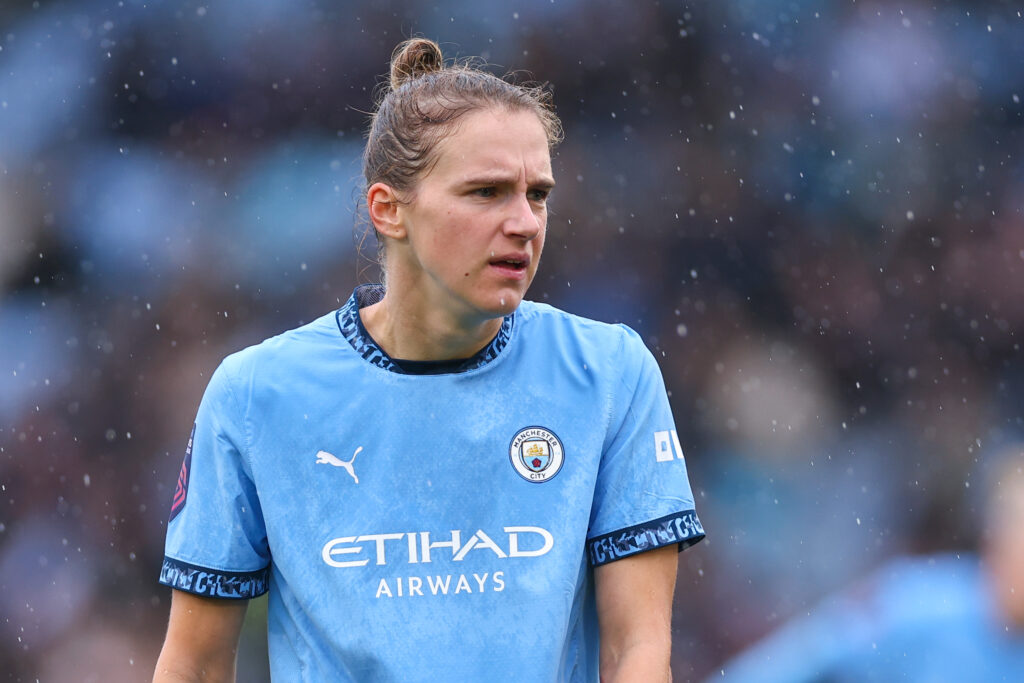
FIFA's deepening Saudi ties concern women's soccer athletes
The partnership with Aramco is simply the latest in Saudi Arabia's investment into FIFA and the sports world in general. The kingdom, which has often been criticized for its widespread sportswashing practices, is imminently expected to be named the men's 2034 World Cup host.
FIFA responded to the players' letter on Monday, calling itself "an inclusive organization." The governing body leaned into the fact that the revenue from its partnerships are reinvested in growing women's soccer.
That reinvestment isn't enough to justify the ethical concerns, according to Miedema. "This is what we don’t want to stand for and accept within women’s football," the Manchester City star added.
"It’s simple: This sponsorship is contradicting FIFA’s own commitments to human rights and the planet."
The 2024/25 Barclays Women's Super League (WSL) season kicks off this weekend in the UK, where 12 teams will launch campaigns to challenge seven-time league champions Chelsea for the season's title.
Adding to the excitement are major roster shakeups and big name signings entering the pitch for the WSL's 14th season.
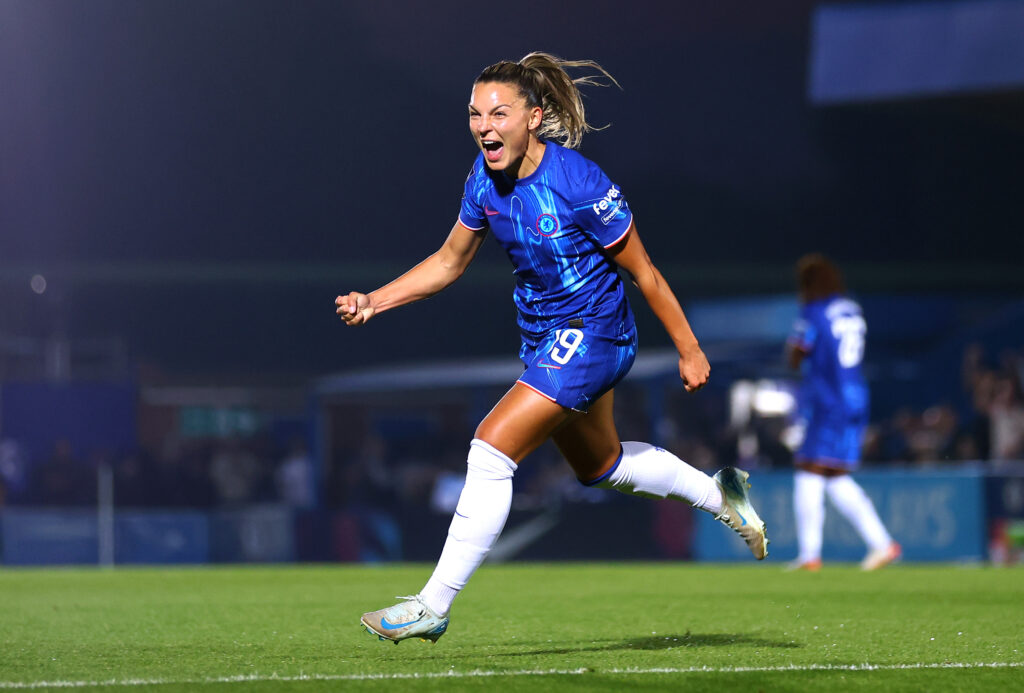
Defending WSL champs Chelsea open post-Hayes era with a win
In front of a sold-out Kingsmeadow crowd on Friday, the Blues began their first campaign without now-USWNT boss Emma Hayes by defeating Aston Villa 1-0. Midfielder Johanna Rytting Kaneryd's first-half strike from distance secured Chelsea's season-opening win.
Helmed by head coach Sonia Bompastor, who previously led France's Lyon to three straight titles and a 2022 Champions League victory, Chelsea enters the season with a target on their backs after five straight years at the top of the WSL table.
With five members of the Blues staff following Hayes Stateside and multiple veteran players — like England national Fran Kirby — also departing the club, Bompastor is now tasked with building a new-look culture while maintaining the club's standard. Her job is that much more difficult given four athletes, including Australian star Sam Kerr and the USWNT's Mia Fishel, are still out rehabbing ACL injuries.
Though Chelsea added top players like the Lionesses' right-back Lucy Bronze, all eyes will be on the Blues to see if their dynasty continues this season.
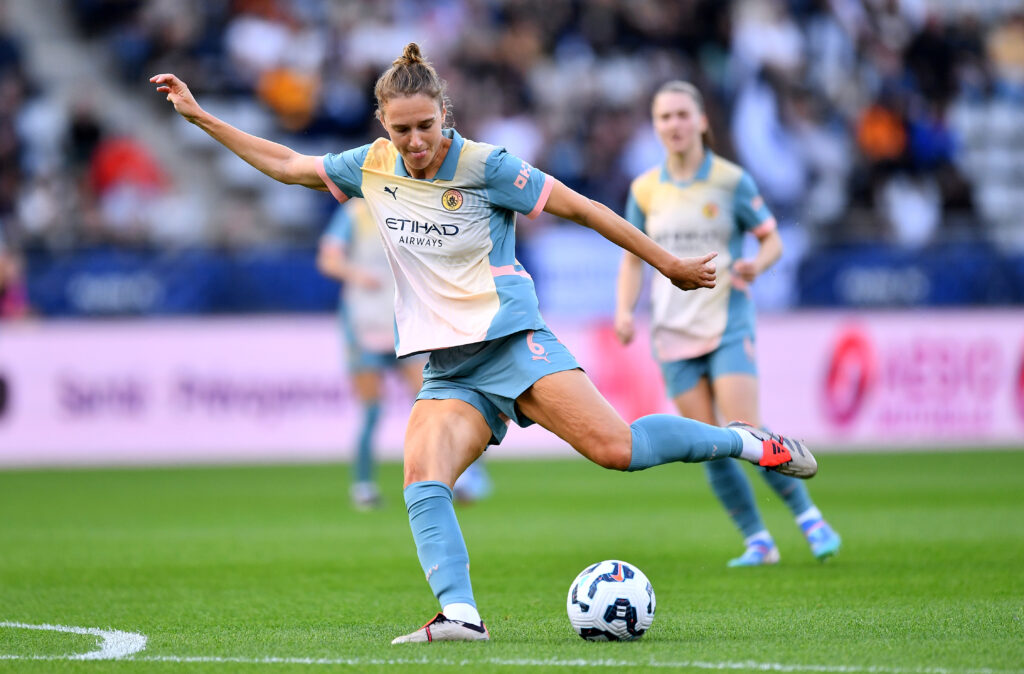
Miedema's return headlines WSL opening weekend
The Blues aside, the highlight of the WSL's season-opening weekend is the blockbuster matchup between an Arsenal legend and her former club.
Dutch striker Vivianne Miedema will play her first regular-season WSL game with Manchester City on Sunday, when the ex-Gunner will face Arsenal in a highly anticipated Emirates Stadium showdown.
The two clubs — who both finished the 2023/34 WSL season just behind Chelsea in the standings — are coming off vastly different UWCL results this week, after Arsenal lost 1-0 to Häcken and Man City defeated Paris FC 5-0.
How to watch Arsenal Women vs. Manchester City this weekend
Arsenal WFC will take on Manchester City at 7:30 AM ET this Sunday, with live coverage on ESPN+.
The Barclays Women’s Super League officially kicks off its 2024-25 run the weekend of September 20th with six matchups across three days setting the stage for the much-anticipated WSL season.
The WSL is growing in more ways than one, and next year’s league title is very much anyone’s to grab.
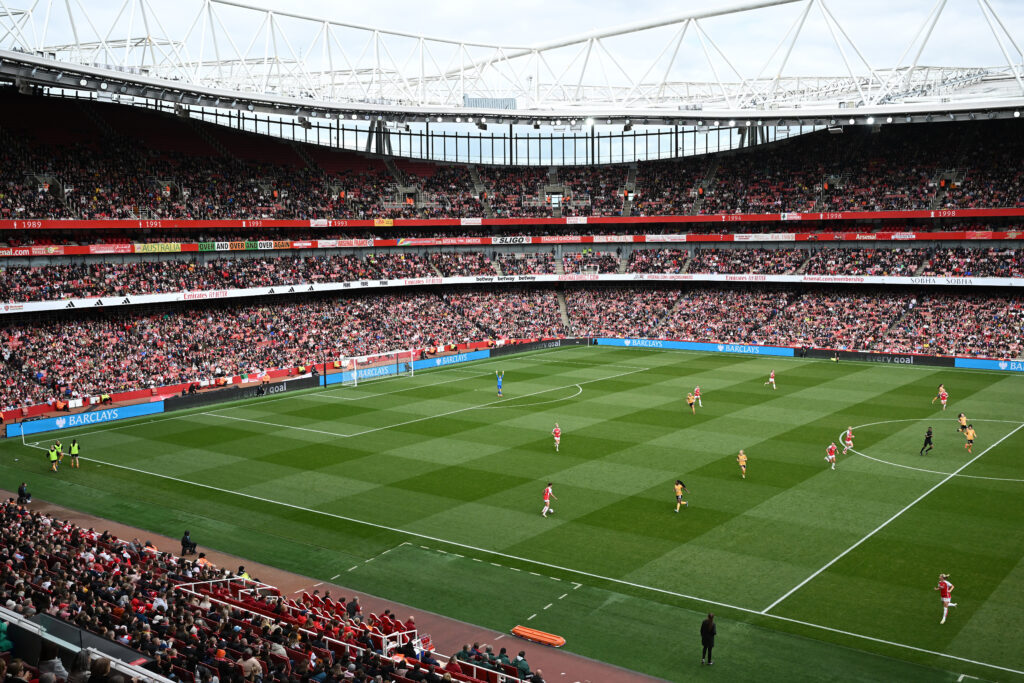
Growing attendance spurs Arsenal move to Emirates
After drawing an average of 52,000 fans to each of their six Emirates-hosted games last season — including two complete sell-outs and three WSL attendance records — all 11 of Arsenal’s upcoming home matches will be played at Emirates Stadium. This makes the North London behemoth — home to Arsenal’s men’s Premier League team — the women’s team’s permanent 2024–25 season home.
Of the league’s 12 teams, only Arsenal, Aston Villa, and Leicester City will share gameday facilities with a top flight men’s division. The rest will play the majority of their matches at practice fields or smaller multi-use stadiums.
In addition to field conditions, access to training centers and equipment, and other on-pitch concerns, capacity is a central differentiating factor between men’s and women’s grounds. For example, Chelsea’s primary home of Kingsmeadow seats just 4,850 fans. Their Premier League counterpart's digs, Stamford Bridge — the 11th largest football stadium in all of England — can accommodate 40,343.
Arsenal’s move to Emirates was motivated in part by this divide, and after finishing the 2023-24 season in third place — nearly missing the cutoff for UEFA Champions League eligibility — the club is hoping this momentum will fuel their quest to lift the WSL trophy in 2025.
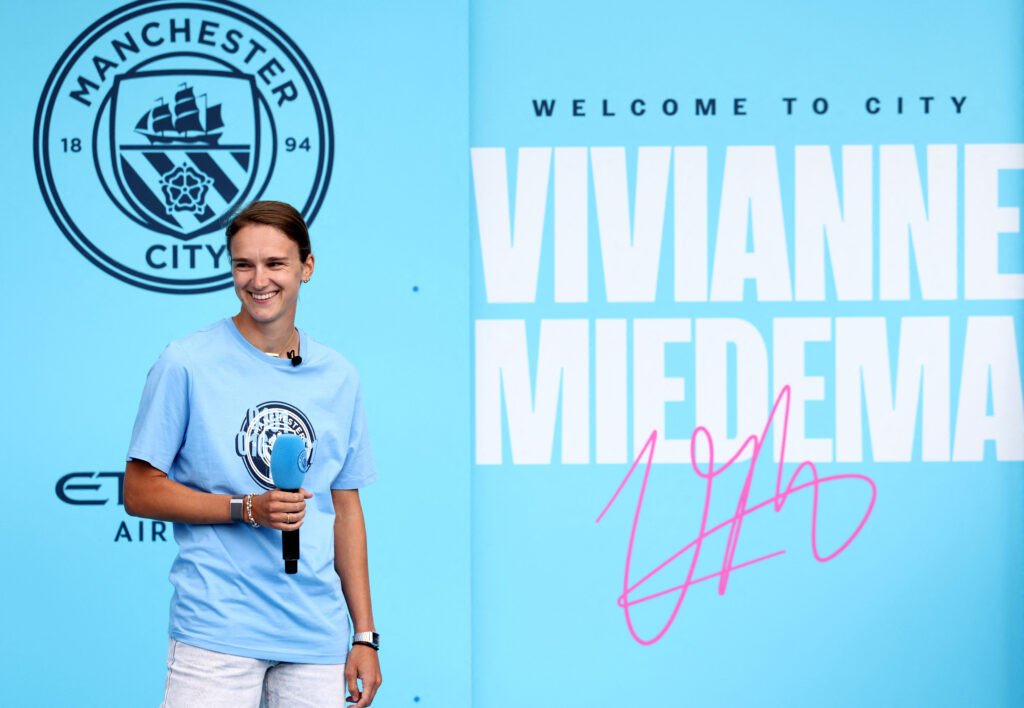
Offseason moves shake up WSL rosters
Arsenal isn’t the only WSL team on a mission to top the 2024-25 table, and teams around the league made serious waves in the offseason in a bid for this season's title.
Manchester City, 2024’s second-place club, bid adieu to Esme Morgan and Ellie Roebuck, but the club added a whole slate of stong footballers, highlighted by star striker Vivianne Miedema. Former West Ham full-back Risa Shimizu and Japan international Ayaka Yamashita are also joining a Blues roster that already boasts superstars like Khadija "Bunny" Shaw and Mary Fowler, among others.
As if losing Sam Kerr to an ACL tear last season wasn't enough, 2023-24 champs Chelsea have since seen Fran Kirby depart for Brighton, and defender Jess Carter and goalkeeper Ann-Katrin Berger flip to the NWSL’s Gotham FC. On the bright side, they snagged England mainstay Lucy Bronze from Barcelona, and Kerr should return to play this fall.
In Manchester United news, the Red Devils picked up Dutch defender Dominique Janssen but bid farewell to 2023 World Cup Golden Glove winner Mary Earps, who joined Paris Saint-Germain. Meanwhile, former captain Katie Zelem signed with ACFC this week.
The WSL summer transfer window is heating up, with a number of big names on the move.
One of the biggest stars on the market is Dutch international Vivianne Miedema. The storied striker's contract with Arsenal — her team of seven years — expired on Sunday, with the Gunners choosing back in May not to offer the WSL’s leading scorer a new deal.
At the time, former England star Ellen White called the decision "shocking that [Arsenal] haven't shown her the love to want to keep her at the club… she's still got records to break. It's just outrageous."
Manchester City is reportedly in the market to land Miedema, who doesn’t appear to be leaving the WSL despite prior interest from outside of the UK.
Meanwhile, 2023 World Cup Golden Glove winner Mary Earps officially left Manchester United for a two-year contract with Paris Saint-Germain, the club announced on Monday.
And in other speculative news, five-time Champions League winner Lucy Bronze is reportedly set to sign with WSL side Chelsea, departing Barcelona after two seasons with the decorated Spanish team. The potential move follows ex-Barcelona coach Jonatan Giraldez's departure for the NWSL’s Washington Spirit, while Chelsea brought on former Lyon boss Sonia Bompastor following Emma Hayes’s departure.
WSL star Vivianne Miedema will be leaving Arsenal at the end of the season, she announced on social media Monday.
In a video posted to Arsenal's main Instagram page, the Dutch striker said that it was time for her seven-year journey with the club to come to an end.
"To have represented a club like this, with so much history and tradition, has been an absolute honor,” she said. "So above all else, I would like to say thank you for making this chapter of my life so memorable."
Widely regarded as one of the best forwards in the world, Miedema has been dealing with an ongoing ACL injury over the past two seasons, an issue that kept her out of last summer’s Women's World Cup. In her personal farewell post, the former Gunner said rupturing her ACL has been "one of the toughest things I’ve had to go through in my career," noting that her Arsenal teammates’ support was "something I’ll always remember."
Even still, she said, "it’s time to move on." Miedema joined the Gunners in 2017 from Bayern Munich, scoring 125 goals and providing 50 assists over 172 appearances. She was the WSL’s top scorer in 2018-19, setting the all-time record with 78 goals as she helped Arsenal win the league title for the first time in seven years.
Miedema took home a second Golden Boot for her efforts during the 2019-2020 season. Her six-goal outing against Bristol City in 2019 still counts as the most goals scored by an individual player in a single match in WSL history. In March 2022, she became the first player in WSL history to reach 100 goal involvements, and remains the league's all-time leading scorer.
Sources have said that head coach Jonas Eidevall's side opted not to offer Miedema a new contract for the upcoming season.
"On behalf of everyone at the club, we thank Viv for her huge contribution towards the success of the team during her seven years with us," said Arsenal sporting director Edu Gaspar in a team statement. "Viv’s goals and overall performances as an Arsenal player have been of the highest quality, and she has created so many wonderful memories for us over the years. We wish Viv and her family the best of health and happiness for the future."
Several hours after the news broke Monday morning, ESPN reported that Manchester City was interested in signing the 27-year-old, pegging City as her "most likely destination." Neither club has confirmed the reports.
Vivianne Miedema is missing the 2023 World Cup with an ACL tear. And as an observer, she is concerned about the growing number of injuries at the tournament and in women’s soccer overall.
The Netherlands star laid out the feelings she is going through as she watches this year’s World Cup, which have ranged from sadness to frustration to fear, she wrote Monday in an op-ed for The Athletic. Miedema tore her ACL in December in a match for Women’s Super League club Arsenal, but she had been advocating for a better solution to the injury problem in the women’s game even before her own ACL tear.
Already, the World Cup has seen one ACL tear – Haiti’s Jennyfer Limage went down against England in a match had to stop watching. To see other players tear their ACLs is “the hardest part of being injured,” Miedema wrote.
Many analysts and fans feared the worst when England’s Keira Walsh went down with an injury in the Lionesses’ next game. While Walsh avoided a tear, her knee injury still underscored the recent rash of injuries in the women’s game.
“It’s worrying that we live in a world where there’s a need to announce it’s not an ACL injury,” Miedema wrote in The Athletic. “Because so many players are out with ACL injuries, we think every player who goes down with a knee injury has one, too. That isn’t always the case. Not knowing the outcome keeps us all scared.”
Miedema pointed to the number of players already out with injuries, including the astounding number of players from the U.S. who are missing the tournament, from Becky Sauerbrunn to Mallory Swanson, Catarina Macario to Christen Press.
“Every time I watch women’s football at the moment, I’m waiting for the next big injury to happen,” Miedema wrote.
While she has been proud for her Arsenal teammates, including Australia’s Steph Catley, it is hard to realize that she and several of injured teammates “not there. You feel so proud – but so sad.”
FIFA and UEFA need to change the packed playing calendar – and take responsibility for the number of injuries, Miedema says. The workload is too heavy for players in a game that is becoming quicker, more intense and more physical. She also would like to see squad numbers grow internationally and domestically, and she would like to see more support from managers and clubs through increased player rotation and more medical staff.
Devastating to see the amount of injuries being picked up in this tournament so far…💔
— Vivianne Miedema (@VivianneMiedema) July 28, 2023
This World Cup should have been played with a 26-player squad to reduce stress on players and to let coaches deal with injuries correctly. #FIFAWomensWorldCup2023
“Before I got injured, I’d been playing every single game for my club or the national team for eight or nine years. It’s just too much,” she wrote. “One positive to being injured is that this is the first time in my adult life that I haven’t had the pressure of having to perform or be a leader.”
With the World Cup shining a spotlight, Miedema hopes the World Cup will make “stakeholders realize something needs to change.”
“To watch a World Cup with 10 of the best players out injured — either at the tournament or recuperating at home — is not a good advertisement for women’s football,” she continued. “From bitter experience, I know it’s even worse for the players themselves.”
Tobin Heath and Christen Press gave voice to what plenty of U.S. women’s national teams fans are thinking following the 1-1 draw with the Netherlands in the World Cup group stage.
The two-time World Cup champions are watching this year’s tournament from home and are breaking down each USWNT match as the hosts of “The RE-CAP Show.” On the latest episode, Heath and Press criticized the team’s decision-making, especially in what Heath called a “disastrous” first half.
“If I was to close my eyes right now, and if you were to tell me that we tied the Netherlands 1-1, I think I would have said, ‘OK, not terrible,’” she said. “But I didn’t close my eyes and watch that game. They were wide open. And what I will say is there’s a result and then there’s performance.”
Looking at the result, a 1-1 draw still gives the USWNT a solid chance to win Group E with a win against Portugal at 3 a.m. ET Tuesday.
“But performance — I mean, that first half was disastrous. And I don’t think there’s any one individual that you point to and say that individual didn’t play well,” Heath said. “I think I looked out on the field and I saw a lot of people that didn’t know what they were doing.”
After the USWNT entered the half trailing 1-0, a much-improved second half saw the team tie the score on a Lindsey Horan header. The energy and belief in the final 45 minutes reminded everyone “what we love cheering for about the U.S.,” Heath said. She also described how Horan had manifested her game-tying goal in conversation with Heath before the match.
“I’m so proud of her,” Heath said. “She told me that she was gonna do that, and she did it. Like, that to me is a U.S. women’s team captain. When the team needed something, she brought it.”
While the USWNT scored on a corner kick and finished with 11 in the match, Heath keeps “coming back” to the ways in which the team could be more effective on corner kicks and other set pieces. A lack of consistency has made it hard for the team to get the timing right, she said.
Later in the show, injured Netherlands striker Vivianne Miedema came on to discuss the match with Heath. Miedema echoed Heath’s tactical analysis, noting that the USWNT would have done well to create more width in their attack.
“If they would have made it a bit wider, you could have run at them. As you know yourself as a winger, you would have loved to get the ball and then go into one-on-one,” Miedema said. “I think you guys then create those opportunities.”
Miedema also questioned whether the USWNT’s tactics played to the strengths of its roster, specifically referring to Alex Morgan, who head coach Vlatko Andonovski has said is playing in a “bit of a different role” at this World Cup.
“I think it’s hard to see some of your players not being able to actually get into their strengths,” she said. “I think if you look at Alex Morgan, she’s probably one of the best strikers in the world for more than a decade now. But she obviously doesn’t get the balls into the box that she probably needs. So you probably need to adjust a bit to the players that you have, and I felt like in our game that didn’t happen.”
To Miedema, Rose Lavelle made a “big difference” in the second half, which helped the USWNT play better from that point.
Still, despite some stronger and weaker individual performances, the team’s play as a whole is the root of the problem. Press described an “intangible feeling” that is lacking so far from the 2023 squad.
“The reason that the U.S. women’s national has won consistently is because of the intangible, and the intangible feeling was there,” she said. “I was even just reading what people were saying in the second half and it was the feeling that every single person in this country believed that we were going to come back and score, and they played like that.
“And I’ve been on the pitch with this team and I haven’t felt that. And that’s what scares me the most.”
That does not mean the team will not be able to build its identity during the World Cup. And that process already is underway.
“To me, it’s another performance where in that first half I saw 11 individuals out on the field trying to play a game of soccer,” Heath said. “And then in the second half I saw 11 individuals that came together as the U.S. women’s team to try to win a game.”
Arsenal manager Jonas Eidevall believes the 2023 World Cup should have kicked off earlier in the year.
The tournament is slated to start on July 20, but the packed women’s soccer calendar places the premier tournament just before the start of the next European season. The quick turnaround means little recovery time for players.
Arsenal just confirmed its fourth ACL tear of the season. And while the club is looking at ways to improve, wider change is needed, Eidevall said. In particular, he pointed to the tight schedule as a factor.
“It is very evident from this summer that this World Cup should have been played earlier. It is evident,” he said. “That would have meant the players could finish the season, have some time off, prepare for the World Cup without so much time off they lose their fitness, they play the World Cup, then there is a gap so they have time off again and then we can start the Champions League qualifiers and the league openers.
“But they didn’t get it right, hopefully in the future they can do it better.”
His concerns echo those of his star forward Vivianne Miedema, who shared her concerns about the workload for soccer players in November – just weeks before she herself tore her ACL.
“I see a worrying pattern. The playing calendar for both the women and the men is simply too full,” she wrote. “Actually, it’s just a shame. We are in a world that goes on and on and there are few players who say anything about it. I do. We go completely crazy with the tax on football players and football players.”
Miedema took a break in November as a result of her schedule, which saw her play for the Netherlands national team in the Euros last July and then roll right into the beginning of the Women’s Super League season with Arsenal.
The calendar has only gotten more hectic in 2023.
Eidevall pointed to this summer’s schedule, noting that if Arsenal were to finish third in the WSL this season, they would enter into the Champions League qualifying round just 16 days after the World Cup final.
“That shows how bad the calendar is. We want to try to finish as high as possible in the table, we want to try to go into the Champions League and we need to do whatever necessary to get there,” he said. “But it highlights a very important issue, if you want to protect players and you want to have importance for the World Cup and the Champions League, but it is impossible for the clubs who are going to play in that playoff round.
“I think there are also qualifying rounds that happen during the World Cup. It really highlights the issues with the calendar, where really important stakeholders like UEFA and FIFA can’t schedule tournaments better to allow players time off.”
Recent reports have indicated that English clubs are pushing back at national teams’ World Cup preparations and will opt to release their players just 10 days before the tournament. The European Club Association has cited the increase in injuries and a concern about player welfare, with a goal to give players more rest time following their club seasons.
Many national teams had planned to start their training camps in mid-June, with the intention of traveling to Australia and New Zealand in early July to give their players time to get acclimated before games begin.
“There are bits that I think clubs can solve internally but there are a lot of things that require the whole world of football to cooperate, we need to do both,” Eidevall said. “Some parts are internal and things we can control, then there are things we need external cooperation with.
“For example, the playing schedule or the cooperation between clubs and national teams or how and when competitions are played and how the international match calendar is done. That requires governing bodies, clubs and national teams working together.”
Arsenal have suffered another blow, as Laura Wienroither has become the fourth player on the squad to suffer an ACL tear in the last six months, the club announced Thursday.
She suffered the injury during Monday’s Champions League semifinal loss. The 24-year-old Austria national team player joins Leah Williamson, Beth Mead and Vivianne Miedema on the Gunners’ roster of ACL injuries this season.
“I’m going to miss every single second of not being on the pitch with this special team,” Wienroither said in an Instagram post. “I’m so proud to be a part of this group and to share experiences with these girls — on and off the pitch.
“I’ll fight like hell to return as soon as I’m ready to get back to following my dream in red and white. This team is really special… I think we can all feel it. Until that time, I’m Arsenal and Austria’s biggest fan.”
Miedema, who tore her ACL in December, posted in support of her teammates: “At least we will all be in the gym together.”
But she also added: “ACL group is full now. Please no more.”
A number of the game’s biggest stars have suffered ACL injuries in recent months, leading to concern over what many regard as an injury crisis in women’s soccer. Mead has called for more research into injuries in the women’s game, and Portland Thorns forward Janine Beckie – who is also sidelined with an ACL tear – echoed those sentiments and called for more resources for women’s teams.
Earlier this season, women’s health specialist Dr. Emma Ross told Sky Sports that women athletes “are up to six times more likely to have a non-contact ACL injury than their male counterparts.”
She added that just 6% of studies in sports and exercise science are done solely on women, which translates into a lack of research and education on women’s injuries.
While some researchers attribute the injury crisis to the physiological affects of the menstrual cycle, including joints becoming less stable during the cycle, there is not enough evidence to draw a link between the menstrual cycle and injuries, Ross said.
“So we do have some information about loose joints,” she said, “but what we don’t have is the end step of whether that really does increase the risk for injury in female athletes.”
Dr. Katrine Okholm Kryger pointed to soccer cleats being geared toward men’s feet as an injury risk factor, as men’s and women’s feet differ in shape and volume. Many cleat manufacturers have begun to develop a women’s specific cleat, which should be available for this summer’s World Cup.
Aresenal is in the midst of its own internal review after its spate of ACL tears, manager Jonas Eidevall said following Wienroither’s injury. Eidevall also called for external cooperation between clubs, national teams and their governing bodies.
“We need to look at the complete picture and see which factors we can control,” he said. “We need to look at that internally to see what we can do better in the future. Some parts are internal and things we can control, then there are things we need external cooperation with. For example, the playing schedule or the cooperation between clubs and national teams or how and when competitions are played and how the international match calendar is done.
“There are bits that I think clubs can solve internally but there are a lot of things that require the whole world of football to cooperate, we need to do both.”